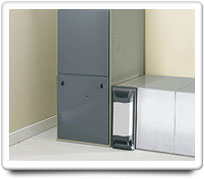Question Topic
Furnace (Gas) Checking For Gas Leaks

Home-Wizard™ calculates your ideal home care program to avoid problems with your Furnace (gas), but sometimes trouble can still occur. Here are answers to questions about furnace (gas) checking for gas leaks.
QUESTION FROM del
we have a gas furnace in the house that we bought. The house is 50 yrs old. We had it checked last year but as you know in florida we do not use it that often. Is there any other way to check for leaks other than to have to get a Pro do it and cost us a lot?
ANSWER FROM HOME-WIZARD
Dear Del:
Here are some thoughts for you regarding gas leaks in your home. As you may know, natural gas smells like rotten eggs. Everyone in your family should learn to recognize this smell. If you ever smell natural gas in your home, here's what you should do:
If you smell a strong gas odor of natural gas, leave and call your gas utility. Never try to locate a gas leak yourself. If you smell a strong odor of gas the rules are:
1) Do not use any devices that might create a spark, such as light switches, phones, flashlights, or even computers. The spark could ignite the gas.
2) Quickly extinguish all embers and flames including cigarettes, candles, and fires.
3) Leave your home immediately and take others with you.
4) Go to a nearby phone and call your local gas utility to report the odor.
If you smell only a faint natural gas odor:
1) First make sure all gas appliances and the burners on your stove are turned completely off.
2) Open windows to bring fresh air in.
3) Check the pilot lights of your gas appliances (furnace, range, water heater, etc.) to see if any of your pilot lights have shut off.
4) If you find a pilot that's out, re-light the pilot it if you know how to and can do so safely. Otherwise, call in a trained service person.
5) If the gas smell is very faint, then you can try to track down the leak by taking a spray bottle with a soap water solution and spraying connections look for bubbles. Gas downstream of the reducing valve is low pressure, so what you are looking for is very small slow bubbles . . . it not like using soapy water to find a leak in a car tire. It can help while you are doing this to have the air calm in the room while you are trying to check for leaks. Just a note of caution that you should make sure you don't get any electrical connections wet. This is especially important when you are checking the gas control valve. Something to consider is that the gas control valve could be leaking through, and you can only check this by pulling it apart.
You had mentioned that you had your system checked last year. Do you know if when they did their inspection whether or not they did a "leak test" with a water manometer? The process involves hooking up the manometer, pressurizing the system to a prescribed pressure, then waiting to see if the pressure holds. If the pressure drops, then there is a leak.
6) If you can't find the source, call your local gas utility to report the gas odor. You should be concerned with ANY gas leak, even the smallest of them. Small leaks usually only get worse.
Hope this is helpful.
Home-Wizard.com
 Overview
Overview Routine Care
Routine Care Q & A
Q & A Articles
Articles



